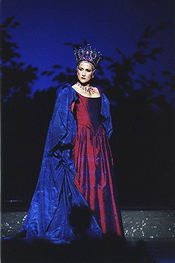
The truth: the Sybaritic Singer fell in love with opera at an outreach performance. Not one that she was performing. No. At the tender age of ten, Opera Iowa performed an abridged version of The Magic Flute in her florescent-lit gymnasium and she was hooked.
Amid all those squirmy children the flame was sparked. The costumes, the miniature set, the Queen of the Night… like Whitney Houston and crack, it was inevitable.
Having been on the other side of the Cafe-torium (the Cafeteria plus Auditorium) the Sybaritic Singer has learned a few things about how outreach rolls. It is extremely important for singers to provide great experiences, no matter the audience’s average age. After all, to stave off the dreaded “opera is dead” debate, we must continue to bring in more audience members. What better way to do that than to get ’em while they’re young?
Here are a couple of things to remember when working with education departments.
-
They’re Gonna Love It!
Kids have fantastic imaginations. You’re singing. You’re dancing. You’re wearing funny clothes and wigs. Where could this go wrong? You are like a sugar-induced, Disney-hallucination made real! If you provide a vehicle for their imagination they will follow you past the curtain call and straight on to the question and answer. Do not be afraid to step out of the English-only mindset. With the right characterization, they will understand. Never lower your expectations.
-
Go For The Goal!
Obviously, our first goal is creating a positive experience for the audience. Even better, they go home and convince their family to come to your next performance. Maybe with those free tickets you raffled off as part of your guerrilla marketing campaign.
 Create a list of educational goals that you hope to provide as well. We know that people have a myriad of different learning styles. Try to structure your goals around different types and patterns. Consider the interdisciplinary value that you may add to their classroom experience. Opera encompasses many opportunities for classroom discussion. Use audience etiquette as a jumping off point that could expand to foreign language, physical education, even math.
Create a list of educational goals that you hope to provide as well. We know that people have a myriad of different learning styles. Try to structure your goals around different types and patterns. Consider the interdisciplinary value that you may add to their classroom experience. Opera encompasses many opportunities for classroom discussion. Use audience etiquette as a jumping off point that could expand to foreign language, physical education, even math.
-
Don’t Be Late
Teachers and administrators are constantly wrestling a tightly-packed schedule.  Overcoming the challenges of getting more information into each brain as well as getting each body through the lunchroom on time is an art form in its own right. They need your art form to be on time.
Overcoming the challenges of getting more information into each brain as well as getting each body through the lunchroom on time is an art form in its own right. They need your art form to be on time.
-
Outreach Is Not Down-And-Out
Singers, repeat after me, “Outreach is not just ‘paying my dues.’ It is a serious performance opportunity and should be treated as such.” You cannot expect to do outreach performances without being fully prepared, warmed-up, and full of character and life. Younger audiences are just as discerning as the concert hall seat-warmers. If you love to perform, it is because you like to rehearse. Without adequate rehearsal, knowledge, and commitment, performing would be scary and unfortunate – you know, like a Sarah Palin speech. However, having already vowed to always do your very best in Relentless Productivity, we won’t have to worry about this issue any longer.
-
Play Well With Others
Nicolas Reveles, Director of Education for San Diego Opera, says that this is one of the most important skills he looks for when hiring. In fact, he says, “I would much rather hire my second choice if that person can get along with colleagues. The most talented singer is not always my first choice if that singer is difficult for others to be around.” Modeling good behaviors like treating colleagues with respect, helping to move sets or costumes, being a true professional is another solid benefit to younger audiences. Often, opera outreach has a travel element to it. Make sure that you are not the one every wants to tie to the bumper for the ride home.

Opera outreach is very important to the continuation of the form, especially in the States. Follow-up with your outreach audiences. This isn’t just one-and-done, folks. We like to believe that culture depends on our art form but to be culturally relevant we must first access them where they are. Second, we must give them valuable experiences that they would like to have again. Third, we must lead them to better and increasingly priceless opportunities to engage.

[…] dedicated to bringing new audiences to our art form and to furthering the reach of opera through educational initiatives. I am also delighted that she will be joining Sir Andrew Davis as an international […]